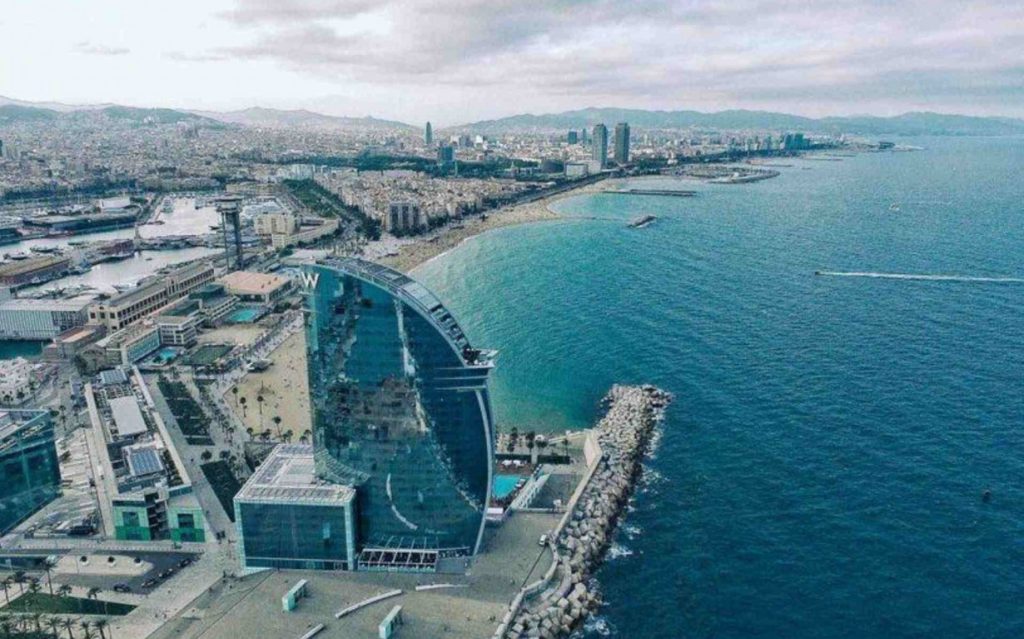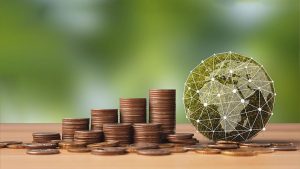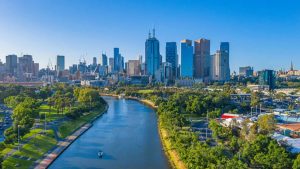
Environmental Impacts Of Tourism In Barcelona: Can Circular Economy Make The City Sustainable?
The number of tourists visiting the city of Barcelona went from 3.7 million in 1990 to 31 million in 2016.
As beneficial as it might seem for Barcelona’s economy, the tourism sector has begun to do more damage than good, destroying their environment and robbing the quality of life of its residents.
The fourth most visited European city, with a population of 1.6 million within city limits, Barcelona is a major cultural, economic and financial centre in the Mediterranean region. It witnessed an increase in overnight visitors from 1.7 million in 1990 to 8 million in 2016.
The city of Barcelona has very little green cover, owing to the population(Pinterest, Aween Ramli)
Barcelona city’s development in these sectors has a dark side, based on the concrete interests of political and economic elites, which has resulted in the commodification of life in the city.
THE CITY OF TOURISTS, OR CITY FOR TOURISTS?
The promotion of Barcelona as a brand, making it the largest tourist affluence in the world, has been continuing since the 1992 Summer Olympics by the public-private consortium Turisme Barcelona. The tourism that was initially perceived as a creator of jobs, is now resented by the local residents due to widening social inequalities and conflicts the industry entails.
Locals perceive tourists as a nuisance, the reason for their poor quality of life. (Bloomberg)
Poor Quality of Life for Residents
- The increasing tourism related private infrastructure has resulted in the expulsion of city residents from their homes due to the increasing prices of real estate, so they can be converted into tourist accommodations.
- The high levels of privatization has also resulted in dwindling numbers of communitarian areas.
- Not just this, it has resulted in the deterioration of quality of life for the locals, with poor living conditions and health.
A Tourist-Dependent Economy
Barcelona’s entire economy has moulded itself to service the large number of tourists visiting the city every year.
Barcelona’s beaches are crowded with tourists, who are mainly responsible for the plastic pollution(RNZ)
- Departmental stores and daily needs commercial activities have been substituted by restaurant terraces and nightclubs for tourists, inaccessible and useless to the local residents.
- In addition, the large amount of specialization of the labour industry maintains the lowest wages in the tourism sector.
- The economy largely depends on the tourism industry, with less opportunities for other productive industries.
- The privatization of the transport industry to produce elitist “quality tourism’, instead of sustainable tourism has resulted in the collapse of public transport and accessibility.
Dangerous Levels of Pollution
- High levels of noise and air pollution are caused by air planes, cruise ships, and private traffic. The large number of nightclubs and commercial areas contributes to increasing the noise pollution in a city with a high population density and narrow, congested streets.
The high population density combined with narrow streets elevates the noise pollution (beBee)
- The metropolitan area of Barcelona is the second-biggest culprit when it comes to emptying plastic waste into the Mediterranean, according to a 2019 report from the World Wildlife Fund. Between Barcelona and Vilanova i la Geltrú, trash accounts for 38% of a fisherman’s catch.
A VICTIM OF AIR POLLUTION
Air pollution in Barcelona is responsible for poor human health, acidification of water and soils, damage to ecosystems, buildings and crops.It is responsible for nearly half of all childhood asthma cases in Barcelona.
Hand in Hand with Tourism : The Aviation Sector
International aviation has a large role to play in the development of the tourist industry in Barcelona. The non-existent taxation on aviation, cheap tickets, an increase in connections, and public investment in airports have contributed to the development.
A tourist who arrives in Barcelona by air plane consumes 605.7 kg of CO2 on average, while a tourist who arrives by train only consumes 52.9 kg of CO2
Barcelona’s airport during peak season, affected by a strike (The Mirror)
- 82% of tourists arrive in Barcelona via airplane. But this system of mobility has strong negative implications on the environment.
- It is estimated that the transport by air plane represents 75% of the carbon emission from tourism in Barcelona.
Cruise Ships: The Bane of Barcelona’s Port
In 2018, more than 3 million tourists visited Barcelona on cruise ship tours, making the city Europe’s biggest cruise destination ahead of other top ports including Palma de Mallorca, Venice or Southampton.
Cruise ship visitors have been as high as 18,000 passengers a day who spend only a few hours in the city (Cruise Mapper)
On a single day, seven ships with 18,000 passengers and 6,000 crew were docked in the port. Most passengers visit the city for around five hours, spending an average of €57 each, and return to their ships at night.
In June 2019, Barcelona was named the number one most polluted ports in Europe. Cruise ships produced 32.8 tonnes of sulphur oxide (SOx), five times more than all of Barcelona’s cars.
Locals stage a protest against cruise ships and cruise tourists, who the tourism industry mainly caters to. (EL PAIS)
- The fuel oil used by cruise ships contains 2000 times more sulphur oxide than in ordinary diesel.
- Cruises accounted for 28.5% of Barcelona’s carcinogenic nitrogen oxide and 3.5% of the city’s particle pollution.
- As per Ecologists in Action’s report, toxic particles were detected as far as 400 km from the port, the impact worsened by ships leaving their engines running while docked.
Overall, Spain is also the most cruise-polluted European country, with 14,496 metric tons of sulfur oxide released in 2017.
No Road for Residents?
A growing number of private vehicles to support the ever growing tourism industry, promoting “quality tourism” is another major polluter for Barcelona. In addition, the building of ring roads has increased use of private vehicles. This has made mobility and public transport less available to the local population.
The community life of Barcelona’s residents is disrupted by the transport industry largely catering to tourists ( Barcelona Home)
ROUND THE CLOCK NOISE POLLUTION
Over half of Barcelona’s population is subjected to harmful noise levels over 65 decibels during the entire day (0800-2200 hours).
Noise pollution in the city is rarely below 65 decibels.
- The effect of noise is further aggravated by high population densities (30,000/km²).
- Tourism is also a major contributor to the noise pollution, originating from nightclubs and an increasing fleet of private vehicles. The city is home to some 1,900,000 vehicles, 0.4 vehicles per inhabitant.
60 PERCENT INCREASE IN WASTE GENERATION
Barcelona residents produce as much as 500 kilograms of waste per capita per year, and most of this is owed to the booming waste generated by tourists (Publicspace)
- Barcelona residents produce about 500 kg waste per year per capita.
- The volume of waste per capita has increased by more than 60% in recent years, many of which are single use.
- Till 1991, there were over 1000 uncontrolled landfills in Catalonia. Now, only 30 regulated landfills remain.
PREVALENT HOMELESSNESS
Immigration, unemployment,, as well as poverty have led to a high prevalence of homelessness. A number of slums, shantytown housing, and degraded multi-family residences can be found across the city.
On any given night, approximately 1,500 people in Barcelona experience homelessness.
The wide social inequalities in Barcelona are responsible for a large population living in poverty (WordPress)
A large number of residents live on less than 1000 euros a month.
INITIATIVES BY THE CITY’S ADMINISTRATION
Solving the Problem of Homelessness
Barcelona city administration works towards social inclusion by having professionals in the streets each day, identifying homeless people in the initial phases of their problems.
Limits on Cruise Ships
The International Maritime Organization limits the amount of sulphur in fuel oil to 3.5%. A new limit of 0.5% will come into force.Under the European Union’s clean air policy, the limit in the Mediterranean may be reduced to 0.1%.
Superblocks have improved local exchange and quality of life for the locals (PublicWorks)
Quality of Life
A new mobility plan was introduced by the city government of Barcelona, based on creating superblocks in the urban spatial plan.
- Barcelona is planning 500 superblocks to solve part of its environmental problems, of which nine have been completed.
- Superblocks have been formed around nine existing blocks around which traffic flows. The internal roads open up to the community, facilitating greater local exchange, foot, bike and public transport, and greening.
- Since 2000, the landfilled portion shrank from 70% to 30% in 2008. Source separation increased from 12% to 32% in the same period.
INITIATIVES BY NGOS
Amigos de la Tierra works to promote and defend social and environmental justice.
It pressures corporations and government agencies to employ sustainable business practices and enforce environmental regulations. It conducts political pressure campaigns and environmental education programs to create a sustainable society.
Friends of the Earth is an umbrella organization supporting more than 300 NGOs. (Amigos de la Tierra)
Ecologistas en Acción is a non-governmental umbrella organisation of more than 300 environmental NGOs. It works to build public awareness, relying on outreach to traditional news media, a strong presence on social networks, production and dissemination of video content via their video channel and El Ecologista magazine.
CSR INTERVENTIONS
Two spanish companies, Iberdrola and Acciona have been elected in the Global 100 of
Corporate Knights sustainability index 2020.
Acciona is a sustainable conglomerate organization, facilitating infrastructure, water and energy needs through innovative and responsible solutions in business.
They are on track with meeting their 2020 sustainability goals.
- Reduced waste generation by 61% compared to 2015
- 75% of non hazardous waste is recovered
- Water consumption reduced by 61% compared to 2017
- GHGs reduced from base year 2017 by 22%
Iberdrola is committed to become carbon neutral by the year 2050. (Financial times)
Iberdrola is a Spanish multinational electric utility company serving around 31.67 million customers. Iberdrola group has committed to reduce absolute Greenhouse Gases emissions by 2030 from a 2017 base-year and to be carbon neutral by 2050 at a global level.
THE BENEFITS OF A CIRCULAR ECONOMY
Globally, the economy would benefit $2 trillion a year from circularity.
Sharp increase in commodity prices in the 2000’s due to exploitation of resources (WE Forum, 2017)
1. Economic Benefits
- Substantial Resource Savings
- Innovation Stimulus
- Economic Growth
- Growth of Employment
2. Environmental Benefits
- Less greenhouse gases
- Vital air, soil and water bodies
- Conservation of nature reserves
HOW WILL A CIRCULAR ECONOMY BENEFIT BARCELONA?
A suggested circular economy model for Barcelona ( Circular Economy EU, FAB City)
Diverting Jobs from the Poorly Paying Tourism Sector
Public policies on the circular economy by the City Council have on average generated over 9400 direct and indirect jobs a year in Barcelona, specially in urban greenery (69%) and mobility (12%).
Space Utility in the Densely Populated City
Being a small and densely populated city, Barcelona has the need to utilize available space sustainably.
- Superblocks aim to reduce traffic by 21%, free up 60% of the streets, and improve air quality.
- In addition, Barcelona and more than 100 municipalities fined banks with properties on their books that have been empty for more than two years.
Bike sharing has become popular in the city, allowing residents and tourists alike to explore the city without (Ajuntament de Barcelona)
The above measures work on improving the quality of life for the local residents of Barcelona, and help in increasing per capita income.
- produced employment in more productive sectors other than tourism, providing job security.
- better working conditions
- reduce congestion, traffic and noise pollution
- reduce squatting, make new jobs and improve quality of lives
- Generate local development benefitting residents. What is not local is not sustainable.
If WHO guidelines are met, 932 to 3000 cases of asthma could be prevented in Barcelona each year.
COMMUNITY INITIATIVES
Earth5R’s ACT project involves citizens in meeting needs and addressing sustainability issues that affect their local ecosystem. If the solution is not local, it is not sustainable.
Earth5R’s Mangrove Cleanup Drive
The Earth5R team conducted a mangrove clean up drive at Bandra Carter Road in January 2019. It took off successfully thanks to the youth of Bandra including local citizens and members of Rizvi NSS.
Earth5R team volunteers cleaning the Mangroves at Bandra Carter Road, Mumbai (Earth5R.org)
The volunteers recovered large amounts of waste which was then segregated, analysed and sent further for recycling.
ABOUT EARTH5R
Earth5R is an environmental organization from India with its head office at Mumbai. It works with the NGO sector, Companies and helps them conduct environmental corporate social responsibility (CSR) programs across India. Earth5R specializes in circular economy based projects. Earth5R also offers short term and long term environmental courses.
Earth5R’s Global Sustainability Hub is a cross-sector and cross-country collaboration in pursuit of UN Sustainable Development Goals. It is an excellent opportunity for governments and the private sector to engage with communities, use Sustainability-based models to drive economic changes and create social and environmental impact.
Reported by Ankita Nambiar, edited by Aastha Dewan




